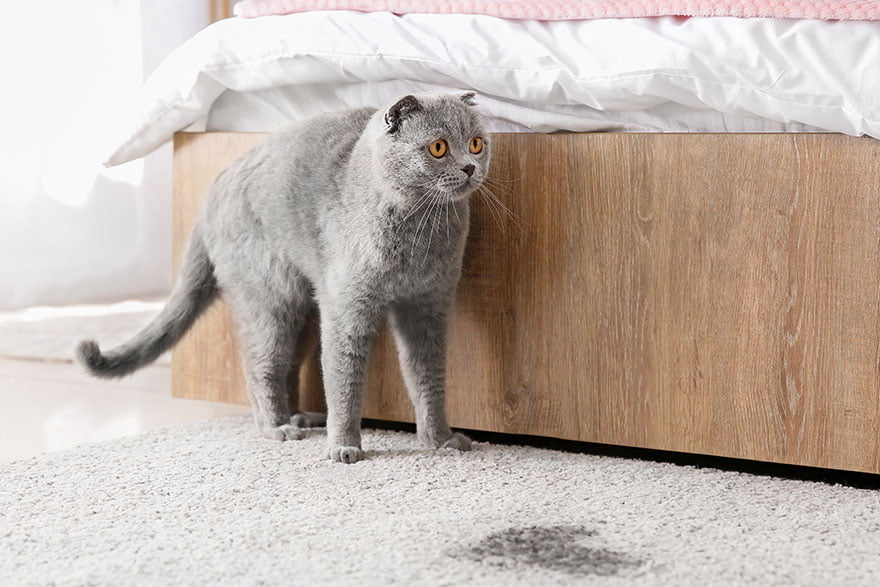
How to Stop Cats Scent Marking Urine
- Share
- Share
- Share
- Share
Learn How to Stop Cats from Scent Marking with Urine In & Around the Home.
So you have the most wonderful snuggle puss, who is beautiful, fun and cuddly, they’re practically purr-fect in every way. If only they’d stop spraying urine around the house.
Over the years I have had so many cat owners talk to me about how they once had the most wonderful cat, who they had to rehome due to them spraying urine within the home, and for most of us, this would be a behaviour to test out limits.
So why do cats spray within the home?
As with most behaviours, there is a list of reasons. It could be that you have an unneutered male (tom) cat who is marking his territory, or a tom cat who was neutered too late, so that the behaviour is now more habitual than it should be. You may also have a nervous cat, who can smell other cats in the neighbourhood and who is trying desperately to keep them away or indeed if you have multiple cats within the same household, they are over-marking each other’s scent, to make themselves feel more secure.
So what do I mean when I talk about spraying as scent marking? This is not a typical urination, near or within the litter box, and nor is it accidental. Marking their scent with urine is usually pre-empted by the cat standing with its tail very erect, and the tail will usually shake or quiver. This posture allows the cat to mix excretions from the scent glands with the urine, which is then squirted backwards at whatever the cat is marking on. As with most wild cats throughout nature, the scented urine smells much more pungent than normal urine and can often have a deeper orangey or yellow colour.
So how do we prevent cats from marking their scent (spraying) with urine? Here’s a list of ideas and suggestions for your convenience.
- As with all behavioural issues, I highly recommend getting a full health check completed by your vet. In some cases, where the behaviour starts out of the blue, over urination and scent marking can be a result of urinary tract infections or kidney stones, so a consult with your vet may be just what is needed.
- If you have an unneutered male, consider housing them in a specific cat area, or having them neutered as tom cats who can smell unneutered females will likely continue to spray.
- Never clean the area with bleach or ammonia-based products. As urine breaks down, the ammonia released smells very similar to those in bleach-based cleaners. I recommend buying the cheapest biological wash powder or liquid from the supermarket, preferably unscented if you can get it, and using a dilution of that to clean any urine spills or marks. The biological aspect of the wash powder actually breaks down the urine and removes the ammonia, so that the cat is not driven to re-mark or spray in the same place.
- Ensure that your cat feels safe. Scent marking within a territory is a behaviour which ensures all other cats in the neighbourhood know that your cat is there and that house in which they live is theirs. Consider ‘cat proofing’ your yards, scrubbing external doors and doorways with biological scrub to remove the scent of other cats, and providing a safe and secure space for your cat within the house.
- Ensure that your cat’s safe space has all of the basic requirements. It is tempting to think that putting the litter tray and bed in the same space would be easier, but it would be the same as us sleeping in the toilet.
- Ensure that your cat has a calm, quiet space, preferably in an area up off the floor, with a comfortable bed and separate area from the litter box. If possible, ensure that they also have easy access to food and water within the same location.
- Check that cat flaps are secure. Is there a chance that other cats in the neighbourhood are accessing your cat flap? If it is possible, consider investing in a magnetic one or adding a cat porch to the outside of your property.
- Ensure that if you have more than one cat living in your property, they are a bonded group. Bonded cats will sleep in the same bed together, will groom each other and will happily eat from the same bowl at the same time. If you have cats which are not in a bonded group, they may need a degree of separation within the house and may need individual spaces to feel more confident.
Ensuring that your cat feels secure within its environment and taking steps to prevent them feeling pressured by other cats either within the home or outside, will eventually allow your cat’s confidence to grow so that they do not feel the need to scent mark and spray around the house.
If you’re still having trouble, browse the many pet behaviourists near you that can help with this problem.
Or, as a member (Membership is FREE) you can leave a comment below and Bec will happily assist you with a reply!
BSc (Applied Animal Behaviour & Training), Post Graduate Certificate in Education.
National Diploma Animal Management.
Aset Care of Animals Award & CENTRA Award in Animal Care.
- Cat Behaviour & Training 1
- Cat Care 1
- Cat Health 1
- Cats 3
- Dog Behaviour & Training 38
- Dog Care 1
- Dog Grooming 2
- Dog Health 1
- Dogs 42
After A Product or Service for Your Pet?
PetsBook's Pet Directory is the easy way to find everything you need to take care of your 'fur baby'.
ABN: 97 675 528 953







